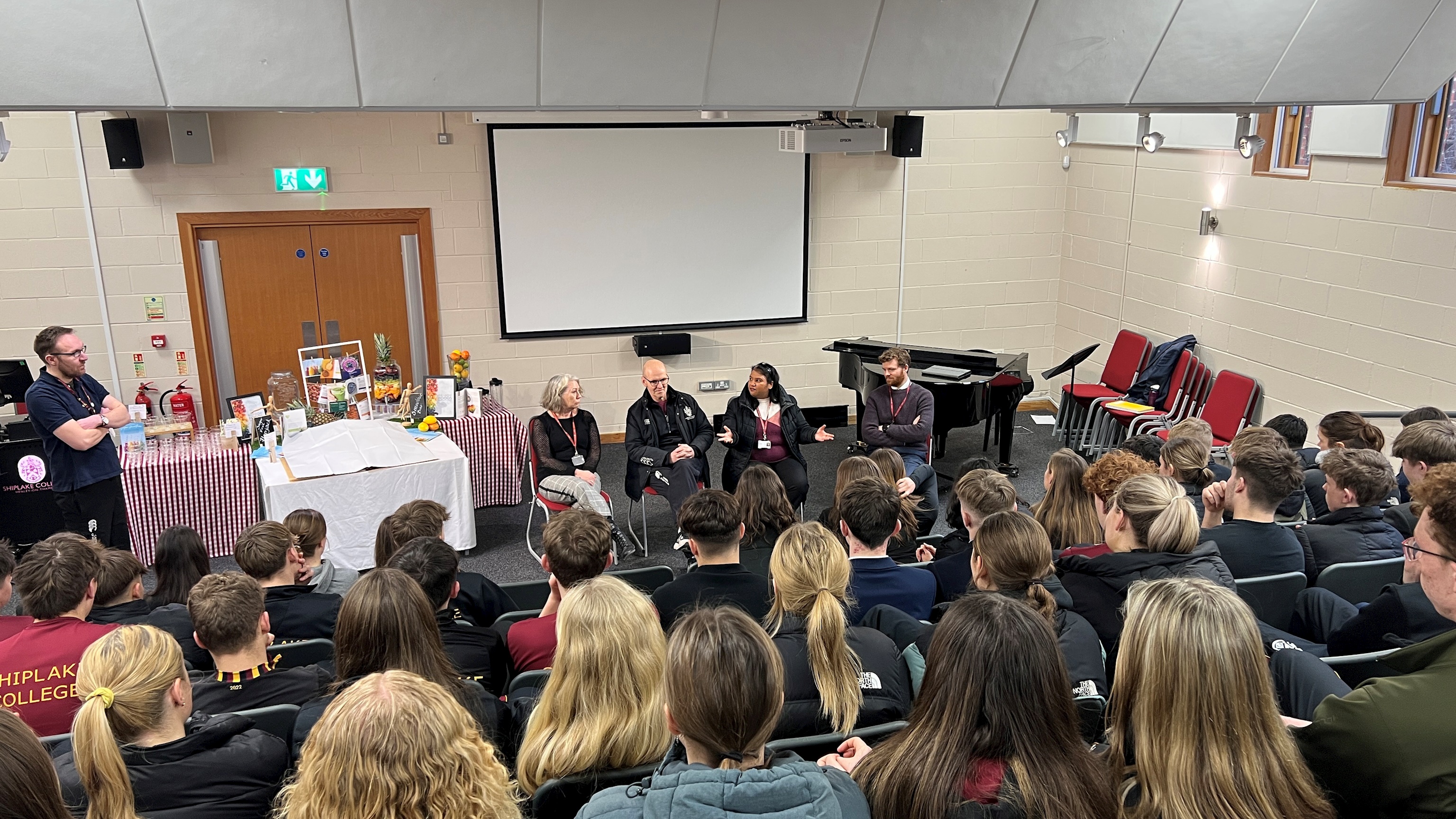
On Thursday 9 February, our Year 12 pupils gathered in the Lecture Theatre for the latest episode of Shiplake College Question Time. Their host, Mr Player, and his 'assembled Super Panel that even the Avengers would be proud of', awaited them for a series of topical questions sent in by the audience.
On the panel 'from the dessert fire and here to inspire' was Mrs Rickard; Mr Pettifer 'can he find the square root or will he be given the boot'; Miss Bhatti - 'is she smart or will she need a restart?'; and Mr Curtis - ‘they say he doesn’t need sleep and that there’s no one he can’t defeat’. Introductions made; the panel were then grilled on the following questions:
Will technology save us or destroy us?
Mr Pettifer was the first to answer and believes that we have a grim future ahead of us, especially if Hollywood productions are to be believed. Likening the situation to that of aliens and the fear of being taken over by extra-terrestrial life, Mr Pettifer thinks that while the idea might still feel far-fetched, it is a possibility that we cannot ignore. However, on a brighter note, he does believe it's a scenario that will not happen for a very long time.
Miss Bhatti thought similarly and pointed out that there is good and evil everywhere - where some people will develop and use AI for positive actions, but there will also be others who will use it for destructive purposes.
Continuing with the negative outlook, Mr Curtis said 'we are already on a path to destruction as a race where we don't understand the impact of our actions until it is too late (eg, global warming).’ He further added that as with social media, where there is little to no regulation, AI is in a similar position where there is no regulation currently.
Mrs Rickard had a slightly more positive view on technology, believing that while the possibilities of technology are far and wide, although still terrifying, it is nonetheless an exciting period to be a part of. Reflecting on her childhood years, Mrs Rickard added that humankind had just reached the moon and everyone grew up believing that they would be living on the moon. That same excitement is present today with technology and the potential it brings.
Do AI programs that write academic essays make teachers irrelevant?
Mr Curtis was first to answer and firstly wanted to emphasise the fine line between those who are independent learners and those who want to take advantage of everything that is on the internet. He further added that inspiration will always come from someone, especially someone who understands on an interpersonal level. There are 'human' characteristics that teachers have that will never be held by a computer or AI - such as asking how a pupil is, understanding their general sense of wellbeing from a glance; as well as inspiring the next generation of teachers.
Miss Bhatti was next to answer and was keen to stress that AI will not be possible without humans and human programming. And, while agreeing with Mr Curtis about the lack of interpersonal skills that an AI program will have, questioned how an AI essay-writing program will fare with a practical project like in art or DET - how will an AI program write a report or a reflection on a practical project that it did not do/make?
Mr Pettifer believed that while these programs will work for a select few pupils, it will not for the majority who require a more human, or personal, approach to learning. He added that the sense of community will be diminished and pupils will also miss out on social interactions.
Mrs Rickard, speaking from the perspective of an examiner, highlighted that it is important to understand the answer, or essay, that you have given. She stressed that learning is not just about writing down an essay on paper, but understanding and applying knowledge. She also added that pupils learn more than academic studies at school, and that sitting at home learning solely from a textbook or a piece of software will not prepare pupils with the skills needed for later life.
Why do we even have detentions? Do they even work?
Arguably the question that is on most pupils' lips, and the topic they are most eager to hear from members of staff, the consensus from the super panel was that detentions are needed and do serve a purpose.
Mr Pettifer questioned the long-term effect on pupils if there were no consequences for bad behaviour. He further questioned how society would be in the future if there were no punishments for wrongful actions. Miss Bhatti agreed, and further added that the consequences of being late or not doing tasks at a professional level will be more severe than at school. At school, pupils can learn from mistakes and try again. However, in the workplace, that second opportunity or chance might not be given.
Mrs Rickard argued that while detentions can be effective, they ultimately do not stop misbehaviour. Referring to the infractions list, she argued that there are repeat offenders which suggests that detentions do not work. As a practical alternative, Mrs Rickard suggested revoking privileges which would involve taking something that the pupil enjoys (such as their phone or sport/hobby) rather than their time.






















